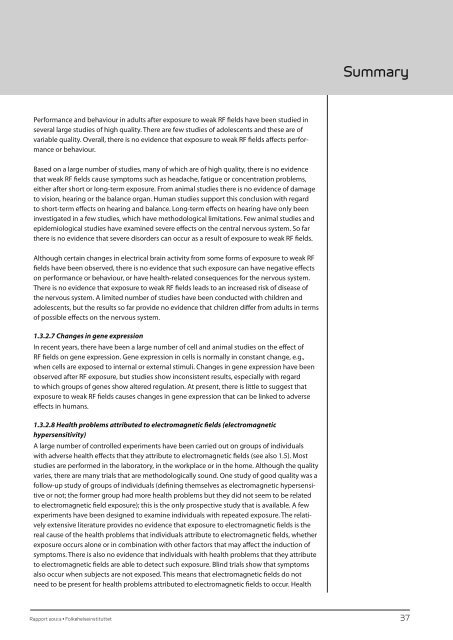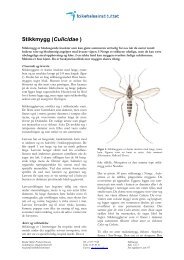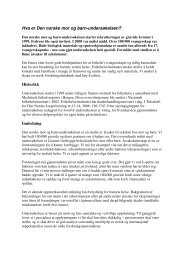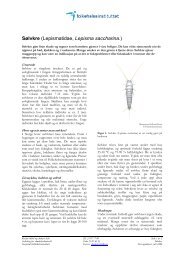rapport 2012:3 - Nasjonalt folkehelseinstitutt
rapport 2012:3 - Nasjonalt folkehelseinstitutt
rapport 2012:3 - Nasjonalt folkehelseinstitutt
Create successful ePaper yourself
Turn your PDF publications into a flip-book with our unique Google optimized e-Paper software.
Performance and behaviour in adults after exposure to weak RF fields have been studied in<br />
several large studies of high quality. There are few studies of adolescents and these are of<br />
variable quality. Overall, there is no evidence that exposure to weak RF fields affects performance<br />
or behaviour.<br />
Based on a large number of studies, many of which are of high quality, there is no evidence<br />
that weak RF fields cause symptoms such as headache, fatigue or concentration problems,<br />
either after short or long-term exposure. From animal studies there is no evidence of damage<br />
to vision, hearing or the balance organ. Human studies support this conclusion with regard<br />
to short-term effects on hearing and balance. Long-term effects on hearing have only been<br />
investigated in a few studies, which have methodological limitations. Few animal studies and<br />
epidemiological studies have examined severe effects on the central nervous system. So far<br />
there is no evidence that severe disorders can occur as a result of exposure to weak RF fields.<br />
Although certain changes in electrical brain activity from some forms of exposure to weak RF<br />
fields have been observed, there is no evidence that such exposure can have negative effects<br />
on performance or behaviour, or have health-related consequences for the nervous system.<br />
There is no evidence that exposure to weak RF fields leads to an increased risk of disease of<br />
the nervous system. A limited number of studies have been conducted with children and<br />
adolescents, but the results so far provide no evidence that children differ from adults in terms<br />
of possible effects on the nervous system.<br />
1.3.2.7 Changes in gene expression<br />
In recent years, there have been a large number of cell and animal studies on the effect of<br />
RF fields on gene expression. Gene expression in cells is normally in constant change, e.g.,<br />
when cells are exposed to internal or external stimuli. Changes in gene expression have been<br />
observed after RF exposure, but studies show inconsistent results, especially with regard<br />
to which groups of genes show altered regulation. At present, there is little to suggest that<br />
exposure to weak RF fields causes changes in gene expression that can be linked to adverse<br />
effects in humans.<br />
1.3.2.8 Health problems attributed to electromagnetic fields (electromagnetic<br />
hypersensitivity)<br />
A large number of controlled experiments have been carried out on groups of individuals<br />
with adverse health effects that they attribute to electromagnetic fields (see also 1.5). Most<br />
studies are performed in the laboratory, in the workplace or in the home. Although the quality<br />
varies, there are many trials that are methodologically sound. One study of good quality was a<br />
follow-up study of groups of individuals (defining themselves as electromagnetic hypersensitive<br />
or not; the former group had more health problems but they did not seem to be related<br />
to electromagnetic field exposure); this is the only prospective study that is available. A few<br />
experiments have been designed to examine individuals with repeated exposure. The relatively<br />
extensive literature provides no evidence that exposure to electromagnetic fields is the<br />
real cause of the health problems that individuals attribute to electromagnetic fields, whether<br />
exposure occurs alone or in combination with other factors that may affect the induction of<br />
symptoms. There is also no evidence that individuals with health problems that they attribute<br />
to electromagnetic fields are able to detect such exposure. Blind trials show that symptoms<br />
also occur when subjects are not exposed. This means that electromagnetic fields do not<br />
need to be present for health problems attributed to electromagnetic fields to occur. Health<br />
Summary<br />
Rapport <strong>2012</strong>:3 • Folkehelseinstituttet 37

















